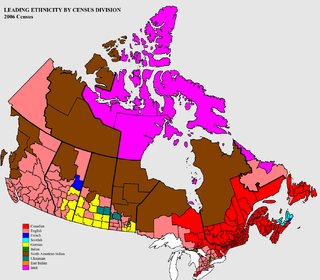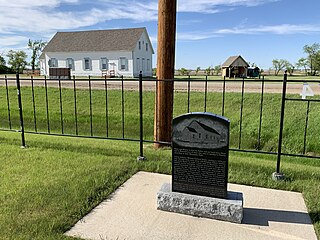Related Research Articles

Mennonites are members of certain Christian groups belonging to the church communities of Anabaptist denominations named after Menno Simons (1496–1561) of Friesland. Through his writings, Simons articulated and formalized the teachings of earlier Swiss founders, with the early teachings of the Mennonites founded on the belief in both the mission and ministry of Jesus, which the original Anabaptist followers held with great conviction, despite persecution by various Roman Catholic and Protestant states. An early set of Mennonite beliefs was codified in the Dordrecht Confession of Faith in 1632, but the various groups do not hold to a common confession or creed.
The Christian Mennonite Conference, formerly known as the Chortitzer Mennonite Conference, is a small body of Mennonites in western Canada.

Rosthern is a town at the juncture of Highway 11 and Highway 312 in the central area of Saskatchewan, Canada. It is located roughly halfway between the cities of Prince Albert and Saskatoon.

Mennonite Church Canada is the conference of Mennonites in Canada, with head offices in Winnipeg, Manitoba. It is a member of the Mennonite World Conference and the Evangelical Fellowship of Canada.
The Fellowship of Evangelical Bible Churches (FEBC) is a small evangelical Christian denomination with an Anabaptist Mennonite heritage. Most of the denomination's approximately 5000 members are in congregations located in the U.S. and Canada.

The Canadian Conference of Mennonite Brethren Churches (CCMBC) is the conference of Mennonite Brethren in Canada. It is a member of the Mennonite World Conference and the Evangelical Fellowship of Canada.

The Mennonite Brethren Church was established among Plautdietsch-speaking Russian Mennonites in 1860, and has congregations in more than 20 countries, representing about 500,000 adherents as of 2019.

The Township of Wellesley is the rural, north-western township of the Regional Municipality of Waterloo in Ontario, Canada. It encompasses 277.79 km2 (107.26 sq mi) and had a population of 11,260 in the Canada 2016 Census.

Steinbach is a city located about 58 km (36 mi) south-east of Winnipeg, Manitoba, Canada. According to the Canada 2016 Census, Steinbach has a population of 15,829, making it the third-largest city in Manitoba and the largest community in the Eastman region. The city is bordered by the Rural Municipality of Hanover to the north, west, and south, and the Rural Municipality of La Broquerie to the east. Steinbach was first settled by Plautdietsch-speaking Mennonites from the Russian Empire in 1874, whose descendants continue to have a significant presence in the city today. Steinbach is found on the eastern edge of the Canadian Prairies, while Sandilands Provincial Forest is a short distance east of the city.

Langham is a town in Saskatchewan, Canada. It is located on Highway 16, 35 kilometres northwest of the city of Saskatoon. The 2011 census reported a population of 1,290, with 489 homes in the community.

A block settlement is a particular type of land distribution which allows settlers with the same ethnicity to form small colonies.

The General Conference Mennonite Church (GCMC) was a mainline association of Mennonite congregations based in North America from 1860 to 2002. The conference was formed in 1860 when congregations in Iowa invited North American Mennonites to join together in order to pursue common goals such as higher education and mission work. The conference was especially attractive to recent Mennonite and Amish immigrants to North America and expanded considerably when thousands of Russian Mennonites arrived in North America starting in the 1870s. Conference offices were located in Winnipeg, Manitoba and North Newton, Kansas. The conference supported a seminary and several colleges. In the 1990s the conference had 64,431 members in 410 congregations in Canada, the United States and South America. After decades of cooperation with the Mennonite Church, the two groups reorganized into Mennonite Church Canada in 2000 and Mennonite Church USA in 2002.
Der Bote was a German-language Mennonite newspaper published in Winnipeg, Manitoba, by Mennonite Church Canada.
RJC High School is an independent high school in Rosthern, Saskatchewan, Canada since 1905. Opening in that year as the German-English Academy, it was founded by Mennonite settlers in response to a need for trained teachers to work in the schools being established in homestead communities in Saskatchewan. Implicit in this perceived need were concerns among Mennonite settlers for the preservation of culture, religious values and the German language, concerns that arose directly from the pressure in the province to make education English and assimilative.

Waldheim is a town of 1,035 residents in the rural municipality of Laird No. 404, in the Canadian province of Saskatchewan, located 57 km north of Saskatoon. Waldheim is located on Highway 312 in central Saskatchewan, the "Heart of the Old North-West". Fort Carlton, Batoche, Battle of Fish Creek, and Seager Wheeler's Maple Grove Farm are all near Waldheim.

Herschel is a special service area in the Canadian province of Saskatchewan. It is the seat of the Rural Municipality of Mountain View No. 318 and held village status prior to December 31, 2006. The population was 30 people in 2016. The community is located 37 km northwest of the town of Rosetown at the intersection of Highway 31 and Highway 656, along a now abandoned section of the Kerrobert-Rosetown Canadian Pacific Railway line. Herschel is the home of the Ancient Echoes Interpretive Centre The Vancouver-based backpack manufacturer Herschel Supply Co., founded by Lyndon and Jamie Cormack in 2009, adopted the name of Herschel, the town where three generations of their family grew up.
Coors Event Centre is an events hall in Saskatoon, Saskatchewan, Canada. The centre contains several large rooms is used for concerts, banquets, and other special events. In 2009, the former theater was renovated and combined with the neighboring former Royal Bank of Canada building. Combined, the centre totals 20,000 square feet.

Reesor is a ghost town located in Cochrane District, Ontario, Canada, along Highway 11, named after its founder, Thomas Reesor.
Peter J. Dyck was a Canadian Mennonite relief worker and pastor best known for his work resettling Russian Mennonite refugees after World War II.

Randolph, originally known as Chortitz, is a small community in the Rural Municipality of Hanover, Manitoba, Canada. The community has an estimated population of 70 and is located 1.6 kilometres north of Highway 52 on Provincial Road 206 about 11 kilometres east of Steinbach. Randolph is located within a half kilometre of the longitudinal centre of Canada.